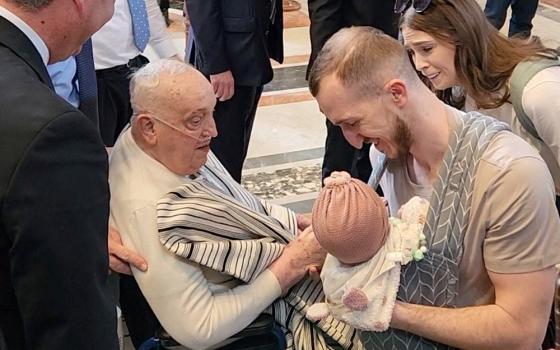
San Diego Cardinal Robert McElroy's closing plenary at the two-day conference "Re-Imagining the World: Saint Francis and Pope Francis" called Francis' worldwide process of synodal consultation is a "call to conversion to the whole church." (Courtesy of University of San Diego/Catherine Ingle)
Pope Francis' worldwide process of synodal consultation is fundamentally a "call to conversion to the whole church," and is "not optional" to such reform, San Diego Cardinal Robert McElroy said Jan. 28.
"Pope Francis has called the whole of the church to a profound process of renewal through a synodal process that seeks to touch and transform every element of our ecclesial life and our outreach to the world," McElroy told a conference hosted by the Franciscan School of Theology at the University of San Diego.
"The current synodal process seeks an outcome far beyond the issuance of new documents, or even a moment of change, but rather an ongoing process of reform and renewal that constantly enhances ecclesial life from the parish to the diocese to the world church," he said.
McElroy's talk was the closing plenary at the two-day conference titled "Re-Imagining the World: Saint Francis and Pope Francis."
'Perhaps the greatest missionary challenge that emerged during the synodal dialogues was the need to invite our young adults back into the life of the church.'
—Cardinal Robert McElroy
The cardinal, who recently wrote an essay calling for "radical inclusion" for LGBTQ people, women and others in the church, also touched on the importance of inclusion for synodality in his talk in San Diego.
The need to foster an inclusive community was one of the most predominant themes throughout last year's listening sessions as part of the synodal process, McElroy said, adding that the "national tapestry of marginalization in the church" included divorced and remarried people; individuals without housing or jobs; immigrants; the elderly; those with disabilities; those suffering from alcoholism, drug addiction and mental health issues, people who are incarcerated and their families; members of the LGBTQ+ community; and people of color and women.
"We believe we are approaching a real crisis in how to minister to the LGBT+ community," McElroy said. "It is clear that the church in the U.S. must transform its outreach to LGBT+ persons if it seeks to be a truly welcoming presence in the world."
He added that the "exclusion of women in the church is part of a wider reality in which lay Catholics are often marginalized in important ways in the life of the church."
"The strength with which all of these ideas were expressed across every region in the country points to the enduring failures of the church to engage and treat women in the manner in which justice demands," he said.
Although the more than half a million Catholics who participated in the listening sessions expressed appreciation for their priests, their parish communities and the opportunity to be heard through the listening sessions, they also raised concerns about clericalism, polarization and sexual abuse.
"Perhaps the greatest missionary challenge that emerged during the synodal dialogues was the need to invite our young adults back into the life of the church," McElroy said, as many on the conference audience nodded.
"Young adults often spoke of feeling as foreigners in the church in which they grew up," he said. "There were many calls for the church to speak out about issues of particular interest to young adults, such as justice, race and climate change."
Advertisement
The cardinal also traced the history of synodality in the church back to the first-century Council of Jerusalem and highlighted how Pope Francis has engaged in "a process of doctrinal development regarding synodality throughout his pontificate."
Francis' vision of synodality involves the "whole of the people of God," constant discernment (not a parliamentary process) under the guidance of the Holy Spirit, humility and honesty, decentralization, authentic listening; participation and co-responsibility; and a "penetrating call to conversion and change."
This call to conversion is essential but "never easy," McElroy said.
"We all tend to become set in our ways in a manner that limits our ability to authentically grow as disciples of Jesus Christ," he said. "Synodality calls us to overcome our complacency and remain actively engaged in the process of lifelong change that lies at the heart of discipleship for us as individuals and as participants in the life of the church."






